Establishing a real estate company in Turkey is not only a legal procedure but also a fiscal commitment. Real estate enterprises—whether focused on development, leasing, or brokerage—must comply with a variety of taxation rules and financial obligations regulated by Turkish law. This article explores the core tax responsibilities, financial reporting duties, and practical considerations for real estate companies operating in Turkey.
1. Corporate Income Tax (Kurumlar Vergisi)
All legal entities in Turkey, including real estate companies, are subject to corporate income tax under the Corporate Tax Law No. 5520.
Key facts:
- Current rate: 25% (subject to change annually by Presidential Decree)
- Tax base: Net income after allowable expenses
- Paid annually in March, based on the previous year’s financials
- Quarterly advance tax declarations must also be submitted
Real estate firms must deduct operational expenses such as:
- Property maintenance
- Legal and consultancy fees
- Depreciation of buildings and equipment
- Interest on loans
- Staff salaries and social security premiums
2. Value Added Tax (VAT – Katma Değer Vergisi)
Real estate transactions are generally subject to KDV, regulated under Law No. 3065.
VAT Rates:
- 1%: Low-income housing, certain government-subsidized projects
- 8%: Some middle-income housing
- 20%: Most commercial property sales and luxury housing
Real estate companies are required to:
- Issue VAT invoices for all property sales and rental services
- Declare VAT monthly via the KDV Beyannamesi
- Offset input VAT (from construction materials, service providers, etc.)
- Pay net VAT to the tax office by the 26th of each month
3. Real Estate Acquisition Taxes and Title Deed Fees
When a real estate company purchases or sells property, it must pay:
- Title Deed Fee (Tapu Harcı): 4% (2% buyer + 2% seller, usually)
- Revolving Fund Fee: Fixed administrative cost
- Stamp Tax (if applicable): 0.948% for certain contracts
Note: Some companies shift these costs via internal agreements, but legally the responsibility is shared unless otherwise stated.
4. Rental Income Taxation and Withholding Obligations
Real estate companies that lease properties are subject to:
a) Corporate Tax on Rental Income
- All rental income is added to gross revenue
- Deductible expenses reduce the net taxable base
b) Withholding Tax (Stopaj):
- 20% withholding is applied by corporate tenants on rent payments
- The withheld amount is submitted to the tax office by the tenant on behalf of the landlord
5. Stamp Duty (Damga Vergisi)
Real estate companies frequently execute contracts such as:
- Property sale commitments
- Construction agreements
- Lease agreements
- Shareholder or investment contracts
Each of these may be subject to stamp duty, typically ranging from 0.189% to 0.948% of the contract value. Digital documents with electronic signature also carry stamp tax obligations if they reflect monetary value.
6. Municipal Taxes and Environmental Fees
Real estate companies also incur local-level taxes, such as:
- Property Tax (Emlak Vergisi) – paid annually to the local municipality
- Environmental Cleaning Tax – added to water bills for properties
- Construction Permit Fees – paid when obtaining a building license
- Occupancy Permit Fees (İskân Harcı) – for finalized structures
These vary by municipality and are determined by property location, type, and size.
7. Financial Reporting and Bookkeeping
Real estate companies must comply with the Tax Procedure Law (VUK) and maintain proper accounting practices.
Key requirements:
- Keep notarized statutory books (inventory ledger, share ledger, journal, general ledger)
- Work with a licensed SMMM (Sworn-in CPA)
- Submit:
- Monthly VAT returns
- Quarterly temporary tax returns
- Annual corporate tax return
- Withholding and social security declarations
Non-compliance leads to tax fines, interest, and legal investigations.
8. Financial Audits and Independent Review (for Large Companies)
If the company exceeds certain thresholds, it becomes subject to independent financial audit under the Turkish Commercial Code (TCC) and POB (Public Oversight Board) criteria.
Thresholds (as of current rules):
- Total assets > 75 million TL
- Net sales revenue > 150 million TL
- Number of employees > 150
Firms meeting two of these criteria for two consecutive years must undergo independent audit.
9. Foreign Currency Transactions and Repatriation
For companies with foreign partners, there are additional financial obligations:
- Foreign exchange earnings must be reported
- Profit repatriation requires board resolutions and proper tax clearance
- Currency movements may be subject to Financial Transaction Taxes
It is highly recommended to maintain accounts in both Turkish Lira and foreign currency, and to file Capital Movements Forms with the Central Bank of Turkey.
10. Tax Incentives and Exemptions
Some tax benefits may apply to real estate companies, especially in:
- Free zones
- Organized industrial zones
- Urban transformation projects
- Build-Operate-Transfer (BOT) models
Also:
- VAT exemptions on certain exports
- Corporate tax breaks for investment-incentive certified projects
- Income tax withholding incentives for employment in special sectors
Each of these requires prior application and documentation.
Conclusion
Real estate companies in Turkey must navigate a comprehensive set of tax rules and financial obligations. From corporate tax to municipal fees, and from VAT compliance to financial audits, failing to meet these requirements can lead to significant penalties.
A robust tax strategy—combined with proper legal and financial counsel—is essential for sustainable and profitable real estate operations in Turkey. Investors are strongly advised to retain a CPA, a real estate attorney, and a licensed broker to ensure full compliance.
INTERN LAW FACULTY STUDENT
YAĞMUR YORULMAZ

Yanıt yok